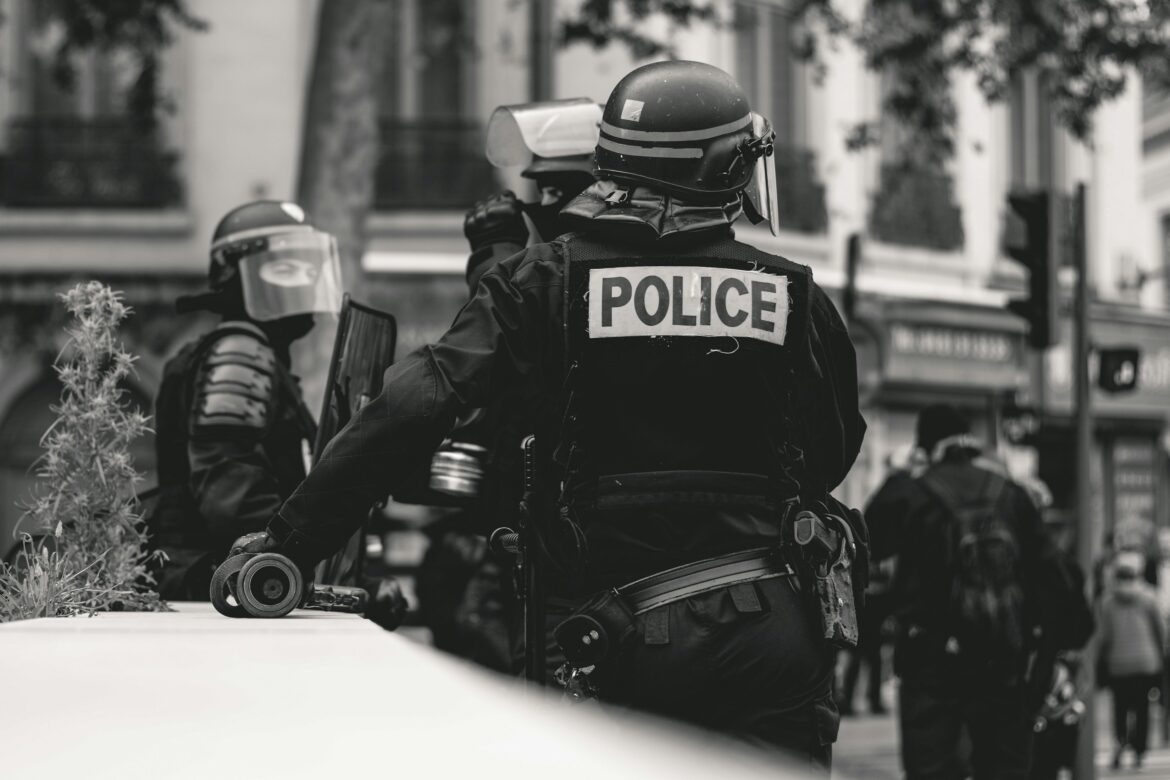Excerpt: An analysis on racial discrimination by police within France and their broader colourblind policies following recent current events: the killing of Nahel Merzouk and the government’s ruling on a pro-police reform class action lawsuit.
France has a rich history of police strength and institutionalised support for their protective services. However, hidden beneath this power and symbol of vigour lies a much darker history of oppression and racism, one which has been silenced and ignored by the French government for far too long. The problem of racial profiling by protective forces has been recognized time and time again, but to no concrete action which addresses the problem at its core. How can an institution meant to symbolize strength and protection of the people, continue to be revered when it hands out injustice daily?
Systemic racial profiling by the police impacts more than just the individual at immediate harm. It strains the overall relationship between the police force and entire communities, causing growing distrust and skepticism over the entire system. Inequality at the heart of government institutions in such ways places additional burdens on marginalised communities to adapt to horrific conditions and treatment. Moreover France allows for this racial inequality to prevail due to their colourblind policies and commandments. French law rejects the notion of collective suffering, including racial oppression, and instead seeks to recognize the individual. This ethos results in a system which is unable to recognize racial inequality, therefore perpetrating oppression through this racial invisibility stance. The June 2023 book Flic: The True Story of the Journalist Who Infiltrated the Police by investigative journalist Valentin Gendrot exposed the often racist and misogynistic behaviour that goes unmonitored and unpunished within the French police force. The allowance of inhumane treatment towards minorities perpetrates an oppressor-centered culture and silences victims by reducing their experiences to isolated tragedies.
In a recent Human Rights Watch report on abusive police stops in France titled “They Talk to Us Like We’re Dogs,” stories of discriminatory and abusive police practices are outlined by French citizens. One of the most alarming instances of abuse shared among many of the participants is the discrimination faced by children of colour in France. Systemic police abuse starts at a young age and continues to affect teens and adults nationwide. Moreover, the discontinuity in opinion that exists in France over police racism is alarming for not only people of colour marginalised by the system but also for the salience of the French police force as a whole.
The most recent attempt at reform was initiated in 2021, when six human rights groups, including Human Rights Watch—an independent organization that investigates and reports on abuse worldwide—launched a large-scale class action lawsuit against the French police force, citing concerns of discriminatory and targeted police searches. The United Nations Committee on the Elimination of Racial Discrimination’s July 2023 statement affirmed the contents of the class action lawsuit in a historic demand for reform. However, on October 11th of this year, the French Council of State handed down their decision on the lawsuit; choosing to dismiss and deny the existence of institutional police racism within France. Through this decision, the French Council of State is demonstrating their ignorance of the genuine harms of racial and ethnic profiling persistently occurring.
While hearings for the class action lawsuit were in full force, this summer additionally held unrest and turmoil for citizens, with the wave of protests ignited by the killing of 17-year-old Nahel Merzouk at the hands of French officials. Merzouk was identified as having Algerian heritage and was shot by police during a traffic stop in late June 2023. The escalation of the incident to violence and death represents a gross misuse of power by a white police officer attempting to discipline a young man of colour. Police stops in France statistically occur significantly more frequently for people of colour, and they more often than not involve the use of a weapon. Merzouk’s death was, unfortunately, one in which race played too large a role. Due to France’s laws against recognizing racialized police treatment as such, it is difficult to seek justice for this kind of abuse. The demonstrations that emerged following Merzouk’s passing represent years of built-up frustrations over the failure of the French police system, and fear for the future should no concrete change materialize soon.
Finding and institutionalizing solutions to France’s systemic police racism problem is a mammoth task which has historically been proven difficult – take the Human Rights Watch’s class action suit as an example. However, experts believe that palpable change will follow with increased international support of the reparations and reform sought in the class action suit. Currently, protest movements and cries for an equality-based resolution stem largely from the French public. Additionally, with the different French authorities so divided over the scale of the existence of racial profiling and systemic police inequality, this change becomes increasingly divisive and volatile. Back in 2016, the French Court of Cassation—France’s highest court—ruled that racial profiling represents a “gross misconduct that engages the responsibility of the state,” other French leaders, such as Interior Minister Gérald Darmanin, claim “it’s false to say there is systemic racism in the national police.” This division between different authority bodies within France increased the complications in passing anti-racist legislature and reform policies. It also reflects the opinion divide between French citizens over the extent to which race is a factor in police killings. Exemplifying this is the fact that a GoFundMe page for the police officer who killed Merzouk was found to have raised more money than the one set up for Merzouk himself, further emphasizing the force behind both ‘sides’.
In January of 2023, the French Prime Minister launched a nation-wide plan to combat racism, antisemitism, and discrimination with the goal of achieving severe reductions in the three areas by 2026. While admirable in its intent, the plan lacks explicit action – specifically relating to the costly effects of police racism; while failing to recognize the institutionalised ills of systemic police racism. The Human Rights Watch organization—the same group that filed the lawsuit with the French Courts—proposed several amendments to the plan in a critique of its current contents, which would modernize the discussions and action surrounding police racism. These alterations include the collection of “disaggregated equality data,” which can then be used to address the pace and intensity of institutional police racism. This data consists of collecting background statistics and information on those involved in police stops, as Merzouk was. Allowing the gathering of this valuable data would enable France to statistically understand the problem they face with police racism and brutality and take steps towards acknowledging the failures of their colourblind system. The division between citizens and the severance of governing bodies from their racialized citizens breeds inaction, as is clearly shown by the lack of anti-racist policy changes and the absence of concrete commandments in the governments’ plan that will lead to the actualization of change.
Police racism in France is unfortunately embedded in its institutions, underscoring the difficulty of finding a path forward which combines equality with feasibility. The need for reform is clear and being pushed for by human rights groups and the general public within France. To fully establish principles of justice for people of colour and maintain a policing system which sees protection for all as a sign of institutional strength, the French government must take a much more aggressive anti-discriminatory, equity-based position.
Edited by Lucy de Cartier

Sophie Hill joined the Catalyst team in September 2023 and is her first year at McGill University studying International Development Communications. Her research interests include media, culture, technology, international conflict and global justice. Sophie aims to approach her writing from an ethical perspective and seeks to provide analysis using a variety of diverse sources to educate and inspire Catalyst readers.

